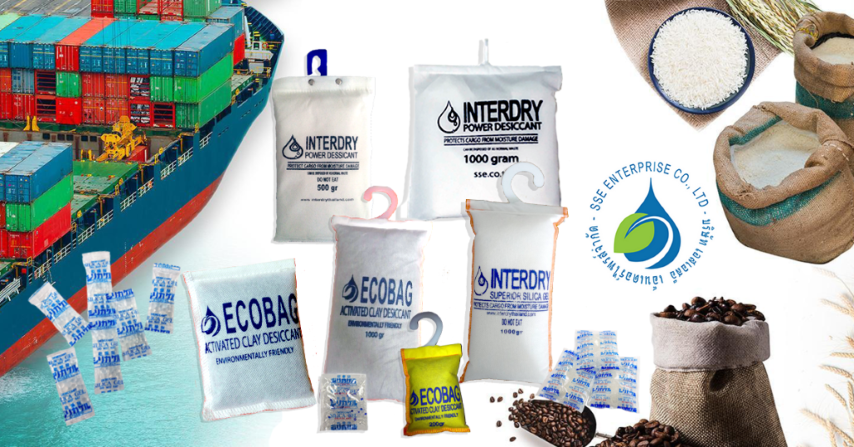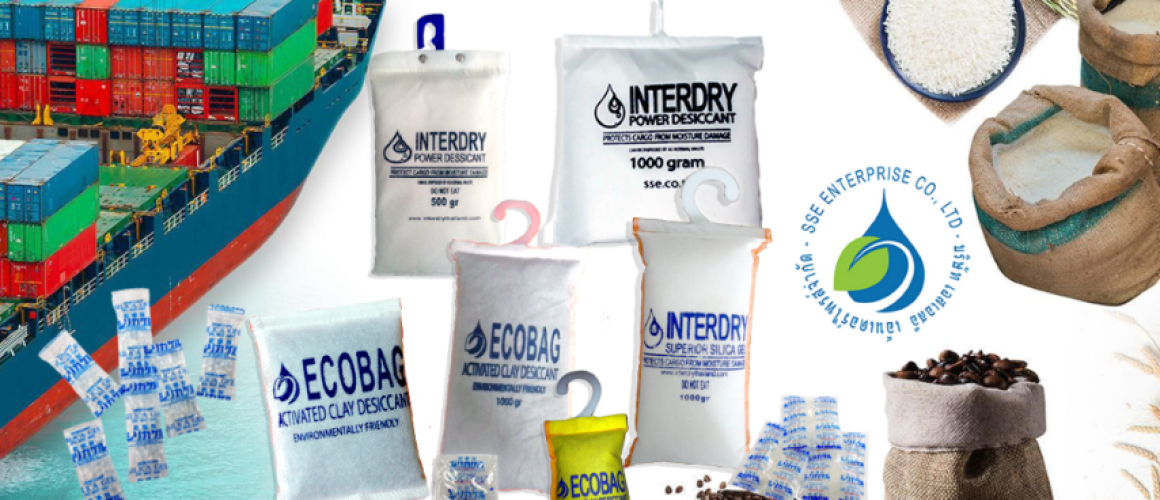Shipping Container Desiccants – Prevent Damage and Offer Product Quality


| Topic | Key Takeaways |
|---|---|
| Importance of Desiccants | Desiccants prevent moisture buildup in shipping containers, protecting products from mold, rust, and damage. |
| Types of Desiccants | Common types include silica gel and calcium chloride, chosen for their high absorption capacity. |
| Applications | Used for transporting moisture-sensitive goods, such as electronics, machinery, and food products. |
| Benefits | Desiccants enhance product quality, prevent “container rain,” and reduce potential losses during transit. |
| Environmental Impact | Many desiccants are designed to be eco-friendly, offering a safe solution for long-term moisture control. |
Table Of Contents
Shipping Container Desiccant
When it comes to shipping goods, it is essential to ensure they arrive at their destination in the best possible condition. One of the biggest challenges in this regard is moisture. Shipping containers are susceptible to condensation, which can lead to moisture build-up, causing a range of problems for the products inside. To combat this issue, container desiccants have become an increasingly popular solution. In this article, we will explore everything you need to know about shipping container desiccants.
What are Container Desiccants?
Container desiccants are products designed to remove moisture and humidity from within shipping and storage containers. They work by absorbing the water vapour present in the air, thereby preventing the build-up of condensation on the container walls, which can result in container rain. Container rain can cause a range of problems for the products inside, including damage to packaging, deterioration of product quality, and even the corrosion of metal parts.
Types of Desiccants
| Type | Description |
|---|---|
| Silica Gel | A widely used desiccant that absorbs moisture effectively, commonly used for various goods. |
| Calcium Chloride | Known for its high moisture absorption, often used for goods that require longer transit times. |
How do Container Desiccants Work?
Shipping container desiccants are made from a range of materials, including silica gel, clay, and calcium chloride. These materials work by absorbing moisture from the air within the damp containers. Calcium chloride is particularly effective as it can absorb up to 200% of its weight in water, making it one of the most effective moisture absorbers available.
Shipping container desiccants are available in bags, which can be easily placed within the container. The bags contain a non-toxic clay desiccant combined with a small quantity of calcium chloride. The desiccant bag for cargo containers absorb water vapours, making them an ideal choice for transporting goods like coffee beans, canned foods, flour, rice, and many more.
Environmental Impact
| Aspect | Details |
|---|---|
| Eco-Friendly Options | Many desiccants are non-toxic and biodegradable, ensuring they can be safely disposed of. |
| Long-Term Sustainability | Use of desiccants helps reduce the frequency of product spoilage, supporting a more sustainable supply chain. |


The Innovative Features of Container Desiccants
One of the most innovative features of container desiccants is the control of dew points within the container. Dew points are the temperature at which condensation begins to form inside the container walls and roofs. Container desiccants aggressively eliminate moisture from within the container environment, preventing container rain and damage to the products in transit. This system prevents conditions that lead to the formation of mildew, caking, warpage, and other types of damage to the bulk foods, glass, equipment, metal parts, agricultural products, and powders.
The Benefits of Container Desiccants
Container desiccants offer a range of benefits for all stakeholders involved in the transportation of goods. These include:
- Safe for use with a variety of food products, directly
- Non-toxic
- Eco-friendly
- Can be disposed of with regular industrial waste
- Quality product
- Cost-effective
- Meet with the FCC and FDA recommendations
- Protects against the “container rain”
- Absorbs up to 200% of its own weight in moisture.
- Prevents mould, mildew, corrosion, and rust
Benefits
| Benefit | Explanation |
|---|---|
| Quality Preservation | Desiccants maintain the quality of goods by absorbing moisture, preventing damage during transport. |
| Cost Savings | Reduces potential losses from spoiled or damaged goods, offering better value for shippers and receivers. |
Application of Container Desiccants
Container desiccants are suitable for use in a range of shipping containers, including ocean, rail, and truck containers. They are particularly effective when used to protect agricultural products such as machinery, wood, textiles, food products, coffee, canned food. They are also suitable for long-term storage and transportation, making them an ideal choice for businesses that need to transport goods over long distances.
Applications
| Industry | Use of Desiccants |
|---|---|
| Food & Beverage | Prevents moisture that can lead to spoilage and maintains freshness during shipping. |
| Electronics & Machinery | Protects sensitive items from humidity-related damage like corrosion and short circuits. |
Frequently Asked Questions
What is the best desiccant for shipping containers?
The best desiccant for shipping containers is one that can effectively absorb moisture and humidity, and protect the cargo from rust, mildew, mould, and corrosion. Container desiccants made of non-toxic clay desiccant combined with a small quantity of calcium chloride are highly effective in removing condensation, moisture, and humidity from within the storage and shipping containers.
How much desiccant do I need for a shipping container?
The amount of desiccant required for a shipping container depends on the size of the container and the amount of moisture present. As a general rule of thumb, it is recommended to use 4-6 kilogram bag of desiccant for every 10 to 15 cubic meters of container space. However, it is always best to consult with the desiccant manufacturer or supplier to determine the appropriate amount of desiccant for your specific needs.
How do you keep moisture out of a shipping container?
There are several ways to keep moisture out of a shipping container, but one of the most effective methods is to use container desiccants. These desiccants help to remove condensation, moisture, and humidity from within the container environment, preventing container rain and damage to the products in transit. Additionally, ensuring that the container is properly sealed and ventilated can help to reduce the buildup of moisture inside the container.
What is the use of container desiccant?
Container desiccants are used to protect the cargo from moisture, humidity, rust, mildew, mould, and corrosion during transit and storage. They are available in bags and contain non-toxic clay desiccant combined with a small quantity of calcium chloride. These desiccants can absorb water vapours up to 200% of its own weight and are ideal for transporting goods like coffee beans, canned foods, flour, rice, and many more. The innovative feature of these Container Desiccants is the control of dew points within the container, aggressively eliminating moisture from within the container environment, preventing container rain and damage to the products in transit.
Conclusion
Shipping Container Desiccants are an effective solution for businesses and stakeholders who want to protect their products from moisture and humidity damage during transit. They offer numerous benefits, including effective protection against moisture and humidity damage, affordability, and safety. They are also eco-friendly, non-toxic, and can be disposed of with regular industrial waste. Container Desiccants are available in a range of sizes and types, making them suitable for a wide range of products and businesses. By using Container Desiccants, businesses and stakeholders can protect their products’ quality, safeguard brand equity and revenues, and reduce their environmental impact.
https://sse.co.th/product-category/container-desiccant/
https://www.sciencedirect.com/science/article/pii/S2666154322002113
ขอบคุณที่ใช้เวลาอ่านบทความของเราเกี่ยวกับการป้องกันความชื้น ทางเราหวังว่าท่านจะได้รับข้อมูลที่มีคุณค่าและเป็นประโยชน์ ทางเรายินดีให้บริการการปรึกษาฟรีเพื่อพูดคุยเกี่ยวกับความต้องการของท่านและให้คำแนะนำเกี่ยวกับวิธีการป้องกันความชื้นที่กำหนดเฉพาะสำหรับคุณ โปรดติดต่อเราที่ 0858124188 เพื่อนัดหมายการปรึกษาหรือเยี่ยมชมร้านค้าของเราเพื่อค้นหาผลิตภัณฑ์ที่ช่วยป้องกันสินค้าของคุณจากความเสียหายจากความชื้น ทางเราหวังว่าจะได้รับข่าวสารจากท่านเร็วๆนี้
